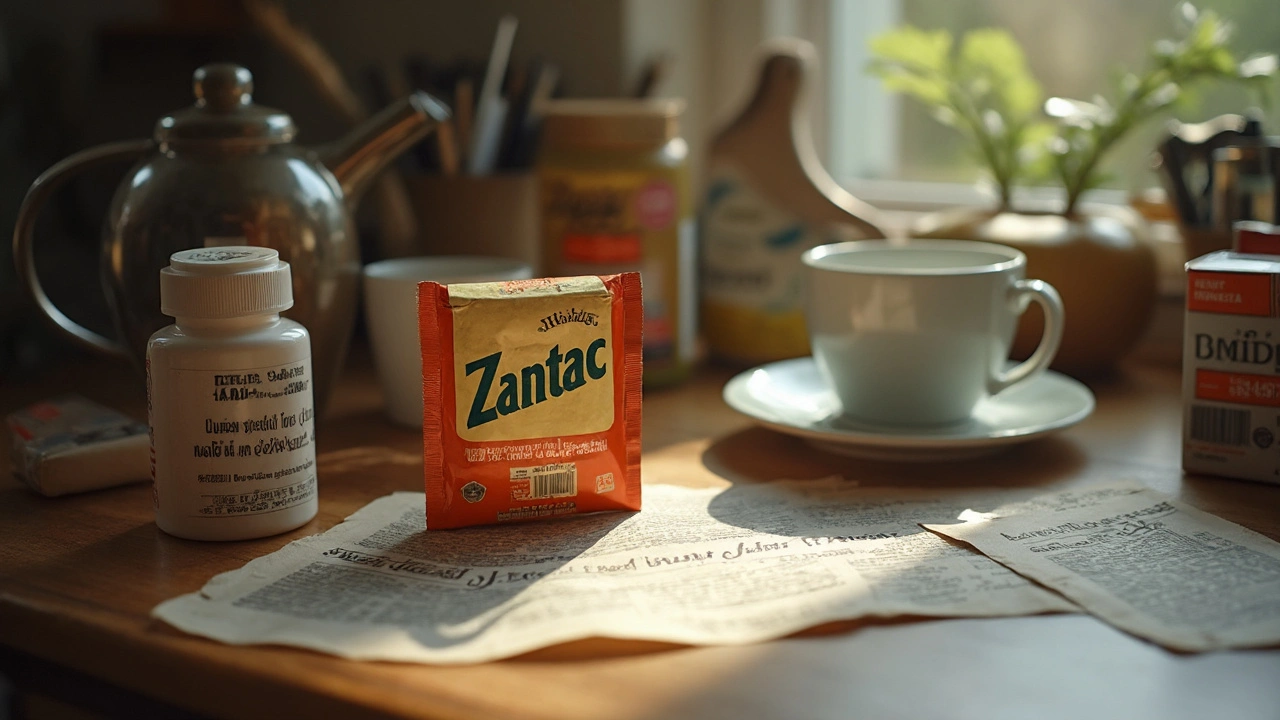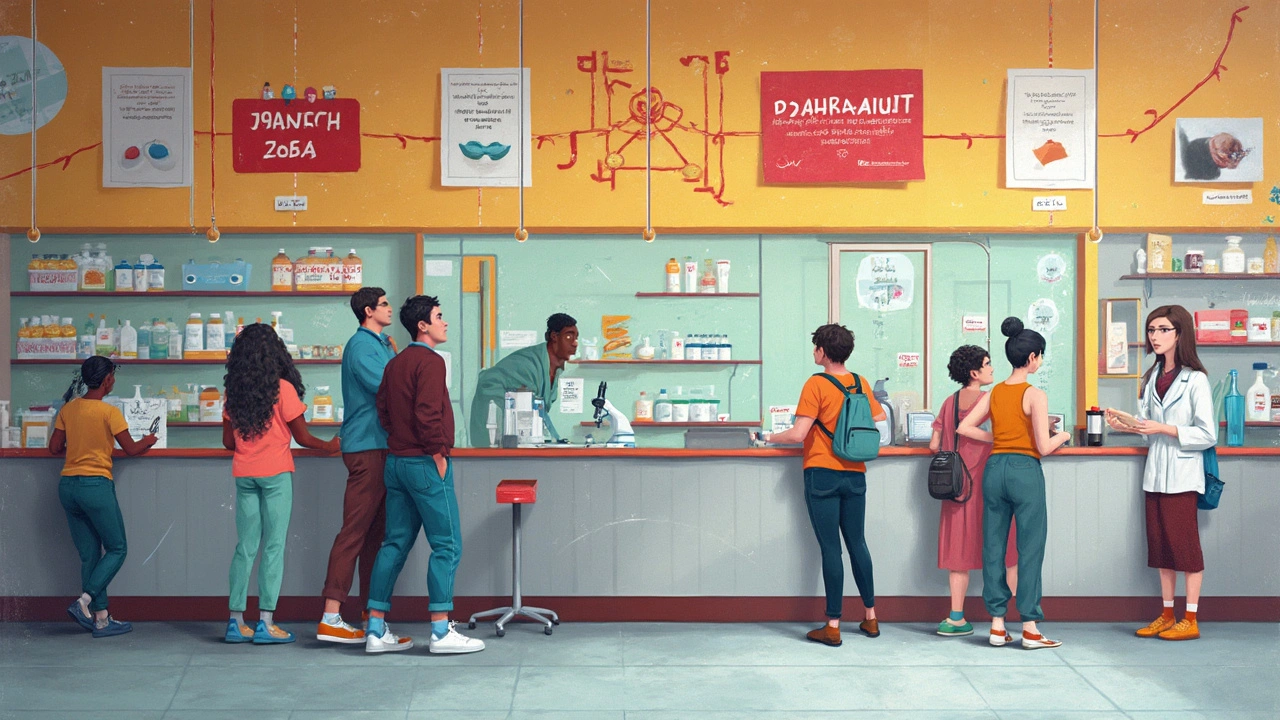Zantac Recall: Facts, Dangers, and Your Best Alternatives Explained

Remember a time when Zantac seemed like the answer to every burning, gurgling bit of acid in your chest? Walk into any pharmacy a few years ago: shelves full of little blue or pink boxes, all promising relief. Zantac was as much a household name as Band-Aids and Tylenol. Then suddenly, it vanished. Not just a quiet phase-out, but a headline-grabbing recall that still has people nervously checking the back of their medicine cabinet. If you’ve ever wondered how a best-selling heartburn pill could go from hero to zero so fast—or what you’re supposed to use now when that late-night burrito comes back to haunt you—you’re not alone.
What Exactly Was Zantac? The Science and the Rise to Fame
Zantac’s active ingredient, ranitidine, hit the market in 1981. Imagine being a doctor back then, with only a handful of tools to combat stomach acid problems. Zantac came in swinging: it worked by blocking histamine H2-receptors in the stomach, slashing acid production with a swipe. It wasn’t just over-the-counter; doctors prescribed it like water. By the late '90s, Zantac was the world’s best-selling prescription drug, and it made its maker, Glaxo, billions. People took it for heartburn, acid reflux, and ulcers—sometimes for years. Pharmacies stocked shelves to the ceiling. Even when the patent ran out and generics flooded in, ranitidine always had its loyal fans.
What made Zantac so appealing? For most people, it worked. Take a pill, feel better, go back to life. No need to clutch your chest all night or live on saltines and ginger ale. This was medicine every regular person could use, not just a niche product for rare conditions. Chances are, you or someone you know reached for it at least once.
The numbers tell the story. In 2018, Americans alone spent over $130 million just on store-brand ranitidine. That’s before counting prescriptions. Glaxo’s Zantac sales peaked over $1 billion in one year. Now, that may not sound insane in the pharmaceutical world, but for a heartburn pill, that’s wild. No one saw the crash coming.
How Zantac Ended Up Off the Shelves: The Recall and the Danger
Here’s where things get weird. In September 2019, a Connecticut-based pharmacy lab called Valisure decided to test heartburn meds for impurities. What they found in ranitidine shocked the industry: levels of a chemical called N-Nitrosodimethylamine, or NDMA, way above what’s considered safe. NDMA isn’t some random bug; it’s a known carcinogen. As in, it can cause cancer if you’re exposed to enough of it for long enough.
The U.S. Food and Drug Administration (FDA) soon confirmed the contamination. But the story got even messier—NDMA was popping up not just in problem batches, but in the drug itself, especially if it was stored too long or at high temperatures. Turns out, ranitidine molecules could break down on their own and create NDMA over time. So, imagine you buy a bottle, toss it in your car or bathroom cabinet, and it sits through months of heat or humidity. The risk just climbs.
The FDA didn’t wait around. By April 2020, all ranitidine products were ordered off the market—prescription and over-the-counter. Pharmacies pulled boxes. Hospitals stopped using it. But the damage was already done; millions had already used it, some for decades. The headlines triggered lawsuits, panic, and a full-blown trust crisis.
Check out this table showing just how much NDMA was found in some samples compared to the FDA’s “acceptable daily intake” of 96 nanograms:
| Product | Tested NDMA (ng per tablet) | FDA Safe Limit (ng) |
|---|---|---|
| Zantac 150 mg (stored properly) | ~5,000 | 96 |
| Zantac 150 mg (heat exposed) | Over 25,000 | 96 |
| Other Ranitidine Generics | 1,000 - 35,000 | 96 |
Suddenly, millions started asking: "Did I just raise my cancer risk without knowing it?" And that’s where the legal avalanche started. It’s impossible to know, for any one person, if their Zantac usage actually caused harm. But those kinds of numbers are enough to make anyone squirm.

The Lasting Impact: Lawsuits, Medical Advice, and Who Is At Risk?
The lawsuits aren’t just a handful of grumpy people. By early 2025, over 100,000 lawsuits had been filed against the companies that made and sold ranitidine. People with specific cancers, especially stomach, bladder, and esophageal, claimed the drug caused their illnesses. The scientific proof is complex—cancer can have many causes, and it’s hard to connect one pill to a disease years later. Some studies show an upswing in cancer risk for long-term users, especially at high doses. But the legal pressure is real. Major settlements have already happened, and drugmakers have paid hundreds of millions to settle claims out of court. If you’re sitting on old bottles, don’t pop them in the trash: pharmacies can help you dispose of them safely.
If you used Zantac in the past, does this mean you’re doomed? No need for panic. The risk is highest for people who used high doses daily, for years. Most people who used it occasionally probably have very little to worry about, according to everything we know so far. Still, if you’ve got health issues or old Zantac bottles in the closet, it’s always worth a chat with your doctor. They can suggest cancer screening if you’re at high risk or just help you figure out if you should be worried.
Medical advice has shifted on acid control meds in general. Doctors used to hand them out like candy. After the Zantac scare and similar news about some other drugs (like certain blood pressure pills), even doctors are more careful. Always keep your pills in a cool, dry place. And don’t take expired meds—old pills are more likely to break down and cause problems.
What Should You Use Instead? Safer Alternatives and Smart Heartburn Management
The big question: If Zantac is out, what actually works? The drug class Zantac belonged to—H2 blockers—still exists. Famotidine, the main ingredient in Pepcid, has never been linked to NDMA contamination. Same class, different molecule, and it’s considered safe for now. You’ll see famotidine everywhere Zantac used to be, both over-the-counter and by prescription. Cimetidine (Tagamet) is another H2 blocker that’s back in the spotlight, but it can mess with other meds, so always ask before taking it regularly.
Then you’ve got the proton pump inhibitors (PPIs): omeprazole (Prilosec), esomeprazole (Nexium), and lansoprazole (Prevacid). These don’t just block the acid; they basically shut down the acid pumps. PPIs are strong, but they’re meant for short-term use—long-term, they can cause issues like bone thinning or vitamin B12 deficiency. So, grab them in a pinch, but don’t make it your daily habit unless your doctor says so.
Baking soda and chewable antacids, like Tums or Rolaids, still have their place. They’re best for quick, short-term comfort, but don’t rely on them over the long haul.
If heartburn sticks around more than twice a week, or if it wakes you up at night, it’s time to talk to a healthcare pro. Sometimes, what looks like acid reflux could be something more serious.
Want to dodge heartburn without a pill? Try these everyday tips:
- Avoid lying down right after you eat—stand or sit instead for a few hours.
- Skip late-night snacks; your stomach needs a break before bed.
- Prop up your bed head with some sturdy blocks if nighttime reflux is bad.
- Drop a few extra pounds; even five pounds can help if you’re carrying extra weight.
- Steer clear of trigger foods like spicy stuff, tomatoes, chocolate, and booze—at least before bed.
- Wear looser clothes. Tight belts or pants can squeeze acid up where it shouldn’t go.
If you miss having a reliable pill for heartburn, you’re not alone. Just make sure the one you pick now is actually safe for you.

Looking Ahead: The Future of Heartburn Relief and Drug Safety
The Zantac saga did more than knock one drug off store shelves. It forced a major industry rethink about how meds are tested, stored, and recalled. The FDA is now way more aggressive about looking for NDMA and other harmful stuff in common meds. Drugmakers have also changed how they formulate and package many drugs, including famotidine and PPIs, to avoid unexpected chemical breakdowns.
If you want to stay ahead of the curve on medicine safety, there’s one golden rule: check up on your regular meds every year or so. Look for updated guidance. If you ever get a weird letter from your pharmacy or hear a news story about a recall, don’t ignore it. Most stores have safe disposal bins—never flush old pills, and don’t donate them just to get rid of them.
Remember, not every headline is a reason to panic, but it’s always smart to question what you’re taking. Ask pharmacists—they love a chance to talk shop and keep you safe. And, if you’ve got a long-term prescription and it’s a household name, double-check that nothing has changed recently.
So, Zantac’s story isn’t just about one drug gone bad. It’s a wake-up call for everyone who depends on medication—heartburn relief shouldn’t come with a side of risk. Now, more than ever, making a simple choice at the pharmacy means asking the right questions, reading labels a little closer, and feeling good about the relief you get—no nasty surprises hidden inside.

alex cristobal roque
July 18, 2025 AT 11:32Reading through this, it's clear that the Zantac recall wasn't just a small hiccup but a major shake-up for people dealing with heartburn. What really struck me was the depth of science behind the issues—the NDMA contamination wasn't something you could just overlook, given its carcinogenic implications. For those who relied heavily on Zantac, this recall must have felt like a blow out of nowhere.
That said, the article does a solid job outlining some effective alternatives, but I'd emphasize that any medication switch should be under medical supervision. You don't wanna dive headfirst into something new without understanding the possible side effects. Also, I wonder if lifestyle modifications got enough attention? Things like diet changes, eating smaller meals, and avoiding triggers can massively reduce the need for meds.
Has anyone else switched from Zantac due to the recall? What alternatives have worked best for you? I reckon sharing real experiences could really help folks still struggling with the transition.
Amanda Jennings
July 20, 2025 AT 18:42I totally agree with you about the lifestyle changes. Meds are great and all, but sometimes people underestimate how much their diet and habits impact heartburn. I mean, cutting back on spicy foods, alcohol, and eating before bed can make a huge difference!
Also, it’s amazing how the recall has made the public a bit warier of what goes into their medicine. We take these things for granted, but hearing about carcinogens in Zantac was honestly quite scary. Thankfully the article provides safe options that don't come with those risks.
Personally, after the recall, I started using some natural remedies along with approved meds. Ginger tea and baking soda have surprisingly helped me on rough days.
It’s great to see info like this laid out clearly to help people make informed decisions! Did anyone else adopt natural remedies after this whole fiasco?
Bridget Dunning
July 22, 2025 AT 09:59What a thoroughly elucidating article! The explanation of the pharmacokinetics involved in Zantac's mechanism, alongside the epidemiological ramifications of the NDMA contamination, truly brings a comprehensive understanding to the fore.
Moreover, the discourse on viable pharmacological alternatives like famotidine and esomeprazole, paired with meticulous guidance on lifestyle adjustments, exemplifies a holistic approach to patient care that is often neglected. It is essential that the medical community continues advocating for patient awareness, not merely on drug alternatives, but also on the biochemical processes that underlie these seemingly quotidian ailments.
Would love to see more peer-reviewed data on the long-term safety profiles of these alternatives. Has anyone come across recent studies worth discussing?
Shweta Dandekar
July 24, 2025 AT 07:17This recall is definitely a wake-up call for the consumers!!! Seriously, how often do we blindly trust pharmaceutical companies? It’s our responsibility to stay vigilant and informed!!!
People must STOP relying only on quick fixes like Zantac and start adopting healthier lifestyles!!! I mean, controlling what you eat is the cornerstone of preventing reflux and heartburn!!! Plus, how about more emphasis on natural remedies instead of blindly taking medicines that might harm us in the long run?!?!?
And let me make it clear: it’s not just a little problem; it’s a ticking time bomb for those unaware!! Safety should be the priority, not convenience!!!
Antara Kumar
July 25, 2025 AT 13:15While I acknowledge the health concerns regarding Zantac, we must also consider that Western pharmaceutical recalls tend to cause overreactions here in India. Many times, traditional medicines that have sustained us for centuries are overshadowed by these scares. Instead of jumping on every recall bandwagon, why not explore Ayurvedic or herbal alternatives that have proven efficacy?
The dependence on Western remedies often undermines indigenous knowledge—which has been safe and effective. We should focus on strengthening local healthcare solutions rather than succumbing to global panic.
Just my two cents, but it’s important to question the real motives behind such recalls as well.
John Barton
July 26, 2025 AT 09:02Ah yes, here we go again. The great panic surrounding a recalled drug that was everyone's comfort blanket for years. Let’s not kid ourselves—Zantac was pulled because of some chemical scare, but how many people have actually suffered? I can hear the conspiracy theories forming already. It almost feels like another way to push newer, pricier meds on us.
Honestly, does anyone really read the fine print or care about the risk levels? It’s always this cycle: trust, scare, recall, then move on without questioning the system that lets these things happen in the first place.
Just saying—that's something we don’t discuss enough.
Achint Patel
July 27, 2025 AT 12:12Philosophically speaking, the notion of a medical 'recall' due to contaminants like NDMA beckons a broader reflection on the fallibility of our healthcare systems. Is the pursuit of a perfect remedy even feasible, or are we destined to grapple with the inherent imperfections in pharmaceutical sciences?
The discourse not only raises questions about safety but also about our blind faith in consumption and the ethics embedded within pharmaceutical manufacturing. One must wonder, does the act of recalling a drug serve as a testimony to scientific progress or as an indictment of initial oversight?
Food for thought, perhaps. Thoughts?
Travis Evans
July 28, 2025 AT 21:49Hey folks, just chiming in with a bit of encouragement. If you’ve been rattled by the whole Zantac saga, remember it’s not the end of the road! Heartburn sucks, but loads of folks have navigated this bump by switching meds and tweaking their routines. It’s like changing the tune to a different beat — it might take some getting used to, but things can get better.
The key is patience and being open to trying new approaches whether it’s supplements, diet changes, or over-the-counter alternatives. Just keep your doc in the loop.
We’ve got your back here! What alternatives are you guys curious about or have already tried that worked wonders?
Max Rogers
August 1, 2025 AT 12:52One thing to add is that when referencing alternatives to Zantac, it's critical to consider each individual's health profile. Some folks may tolerate famotidine well, others might find PPIs better suited. What's important is to avoid abrupt discontinuation without consulting healthcare providers, as that can exacerbate symptoms.
I also appreciate the article’s tips on heartburn management—a combination of medication, diet, and lifestyle tends to work best. Keeping food diaries can help pinpoint triggers too.
Anyone here tracking their triggers already? Sharing helps us all handle this better!
Louie Hadley
August 4, 2025 AT 23:32This whole Zantac episode just underscores how much we need transparency in drug manufacturing. The fact cancer-causing impurities flew under the radar for so long is alarming. But I like how the article doesn’t just stop at recall news; it offers actionable insights on safer substitutes and lifestyle hacks.
Heartburn is no joke, but handling it wisely involves more than popping a pill. Has anyone tried the recommended substitutes? What’s your take on their effectiveness and side effects?
Ginny Gladish
August 17, 2025 AT 09:52Well, I find the recall to be a double-edged sword. On one hand, it's reassuring that authorities act when safety issues arise. On the other, it breeds skepticism that can paralyze patients from trusting future medications.
The article thoroughly breaks down the risks and gives concrete advice, which is refreshing compared to the fear-mongering that often dominates these discussions. However, I remain concerned about long-term consequences we may not yet fully understand.
Do you think the pharmaceutical industry should overhaul its quality controls radically, or is this just part of the growing pains as science advances?